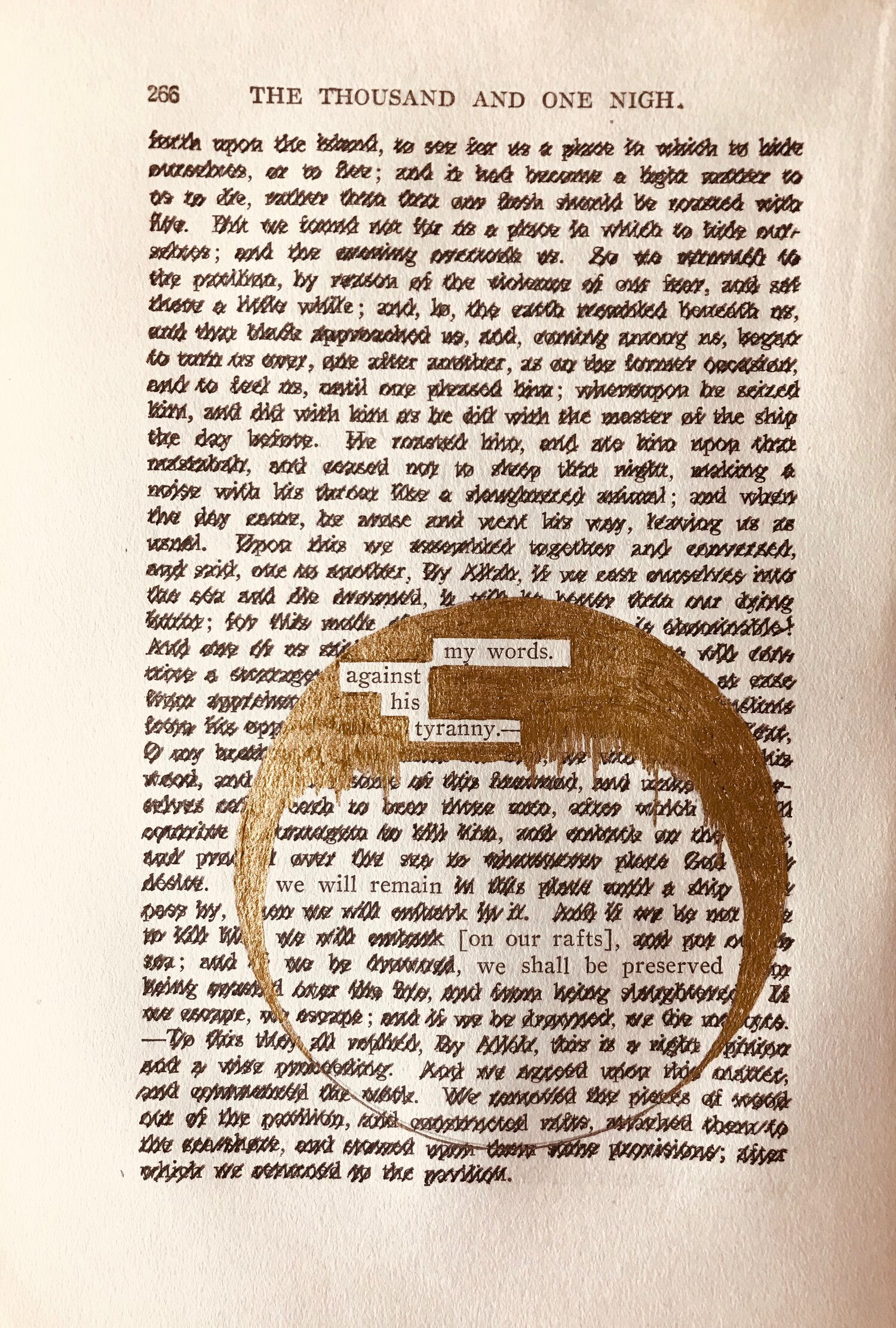Lying flat is justice

"Last year, in a café near where I live in Istanbul, I noticed an old book on a shelf. It was the kind of place that seemed to have bought its books by the metre to decorate the walls, so I asked if I could keep the volume that had caught my eye: a cheap edition of Edward Lane’s translation of The Thousand and One Nights, first published in 1838. I took the book home and began to deface it. Thus began a project of erasure, excerpted overleaf, which has grown alongside my work on a new translation of the text."
READING IN MY TABS
- Laziness is fine, and lying flat is justice.
- “The climate crisis is not gender-neutral in its root causes, which grow out of patriarchy, among other things. It is not gender-neutral in its impacts because women and girls are on the back foot, in various ways. Extreme weather events are being tied to early marriage, to sex trafficking, to domestic violence […]. And, certainly, women have not been at the table anywhere near equally in shaping the status quo that we find ourselves in. And the same is true for people of colour. The same is true for Indigenous peoples.” [The climate crisis is worse for women) and what can we do? “[…] ask people: What are your superpowers, and how can those be contributed in some way to the work that needs doing on climate? Because we are so much more than our consumer choices, we are so much more even than our voting practices and civic participation. Many of us can find ways to weave climate into our professional lives. And that, for me, is when things start to get powerful.”
- I have been quite uncomfortable with how the IPCC report language was framed (“unequivocally caused by human activities”) but could not place why. When I read these Instagram infographics I finally understood why. Also: Not a single G20 country is in line with the Paris Agreement.
- "... like a struggling forest, the web is no longer healthy. It has been wounded and depleted in the pursuit of profit. Going online today is not an invigorating walk through a green woodland — it’s rush-hour traffic alongside a freeway median of diseased trees, littered with the detritus of late capitalism. If we want to repair this damage, we must look to the wisdom of the forest." What trees tell us about the Internet.
- Minus is a finite social network where you get 100 posts — for life. Reminds me of this post from Craig Mod on the idea of timeboxed newsletters, and getting comfortable with the impermanence of our projects — move on to the next project once it gets saturated, peaked, or it just does not work anymore.
- "Garland came to the same realisation that many of her fellow educators have reached in the past four years: the concept of file folders and directories, essential to previous generations’ understanding of computers, is gibberish to many modern students. [...] in an age where every conceivable user interface includes a search function, young people have never needed folders or directories for the tasks they do." Totally fascinated with this article on the intergenerational knowledge management gap!
- TIL Marchetti's Constant: the average time spent by a person for commuting each day. Its value is approximately one hour or half an hour for a one-way trip. This principle has profound implications for urban life. The value of land is governed by its accessibility — which is to say, by the reasonable speed of transport to reach it.
- What do you mean when you say you love 'Malaysian' cuisine? A Malaysian-Dayak writes about the lack of East Malaysian representation in narratives surrounding our national cuisine.
- There's this newsletter about dumplings and it's called Above the Fold and I'm all for it.
- "Do not care if you just arrive in your skeleton. Would love to take a walk with you. Miss you."
RESOURCES AND TOOLKITS
- Feminist Internet Research Network (FIRN) is building an emerging field of internet research with a feminist approach, to inform and influence activism and policymaking.
- The Remote Access Archive gathers stories, documents, and other information about how disabled people have used technology to interact remotely.
- Digital Transgender Archive is to increase the accessibility of transgender history by providing an online hub for digitised historical materials, born-digital materials, and information on archival holdings throughout the world.
- Rethinking Users is a set of toolkit that offers a new perspective that embeds all users in a framework of complex, linked experiences. These experiences have design ramifications we often overlook.
STATUS BOARD
- Reading: Elif Shafak’s The Island of Missing Trees and The Critical Methodologies Collective’s The Politics and Ethics of Representation in Qualitative Research: Addressing Moments of Discomfort.
- Listening: Silvana Estrada.
- Watching: Nothing new at the moment!
- Food & Drink: Today I am having sweet and sour fish with basmati rice, and iced coffee with grass jelly.
Don't miss what's next. Subscribe to Two Kinds of Intelligence: